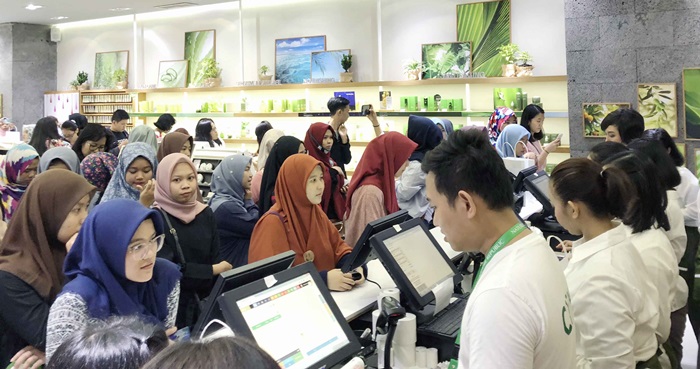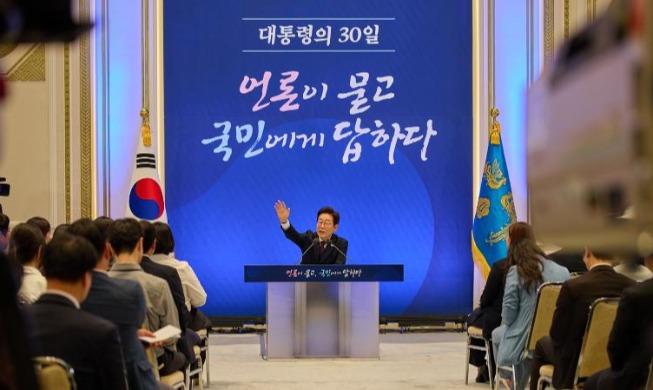
Muslim shoppers wait in line to buy cosmetics from a Korean makeup company, Nature Republic, which recently opened its first store in Jakarta, in the Indonesian capital in January. (Nature Republic)
By Kim Young Deok, Kim Ji Woo and Hahm Hee-eun
“We had to build entirely new systems for halal cosmetics, from manufacturing, mixing and the production line all the way to storing the raw materials.”
The cosmetics companies Cosmax and Daeduck Labs expressed the difficulties they faced when choosing to produce halal cosmetics. However, as a result of these efforts, Cosmax has been certified by the Indonesian halal certification body, Majelis Ulama Indonesia (MUI), after three years, and Daeduck Labs was certified by the Turkish halal certification organization, GIMDES, after eight years.
The word "halal" simply means products that are permissible or lawful to eat or use according to traditional Islamic law. For example, makeup removers that contain alcohol or cream products that contain pig gelatin are both classified as "haram," the opposite of halal, which means “forbidden.”
Halal is an important purchase criterion for many consumers across the Muslim world. For example, take something like a "Pig Nose Pack" makeup face mask, which doesn't contain any pig-related ingredients but which has a drawing of a pig on the packaging. That would generally not be chosen by a Muslim consumer.
An representative of Cosmax, which received its halal certification in 2016, said, "Since halal and haram materials can’t be stored in the same place, we've created production lines and facilities just for halal production at our local factories." They further explained the strict halal certification standards, saying that, “A minimum of six months is required to examine the whole production process, to see whether it is operated appropriately.”
Magdalena Krisnawati, a shopper from Indonesia, said she has been using facial masks and skin care products from Korean cosmetic companies for many year. "For many Muslims, including myself, halal is an important factor when it comes to product reliability. I feel safe when using halal cosmetics."
Besides halal certification, many Korean cosmetic companies are also attempting to enter markets with predominantly Muslim consumers by considering the cultural and climatic characteristics of Middle Eastern or Southeast Asian countries. Demand for Korean makeup and cosmetics has been rapidly increasing in many such markets due to the growing popularity of Korean TV shows, movies and music there.
In Indonesia and Malaysia, two markets with predominantly Muslim consumers that tend to stay hot and humid throughout the whole year, lip products that focus on coloration and perspiration sell very well, rather than cosmetics and moisturizers that are waterproof. One Korean cosmetics company said that, "Saudi Arabian women tend to emphasize their eyes with makeup, and therefore they mostly buy cosmetics for the eyebrows or eyeliner."
Jang Geon, the head of the Korea Institute of Halal Industry, as well as an expert on Middle Eastern economies, said, "These days, Korean cosmetic companies are actively developing products tailored to consumers in the Middle East, where colored cosmetics are preferred, and in Southeast Asia, where basic skin care items are preferred. In order to go further beyond Middle Eastern countries and into Central Asia and northern Africa, Korean cosmetic companies have to keep in mind that cultural differences are important business factors."
kyd1991@korea.kr
